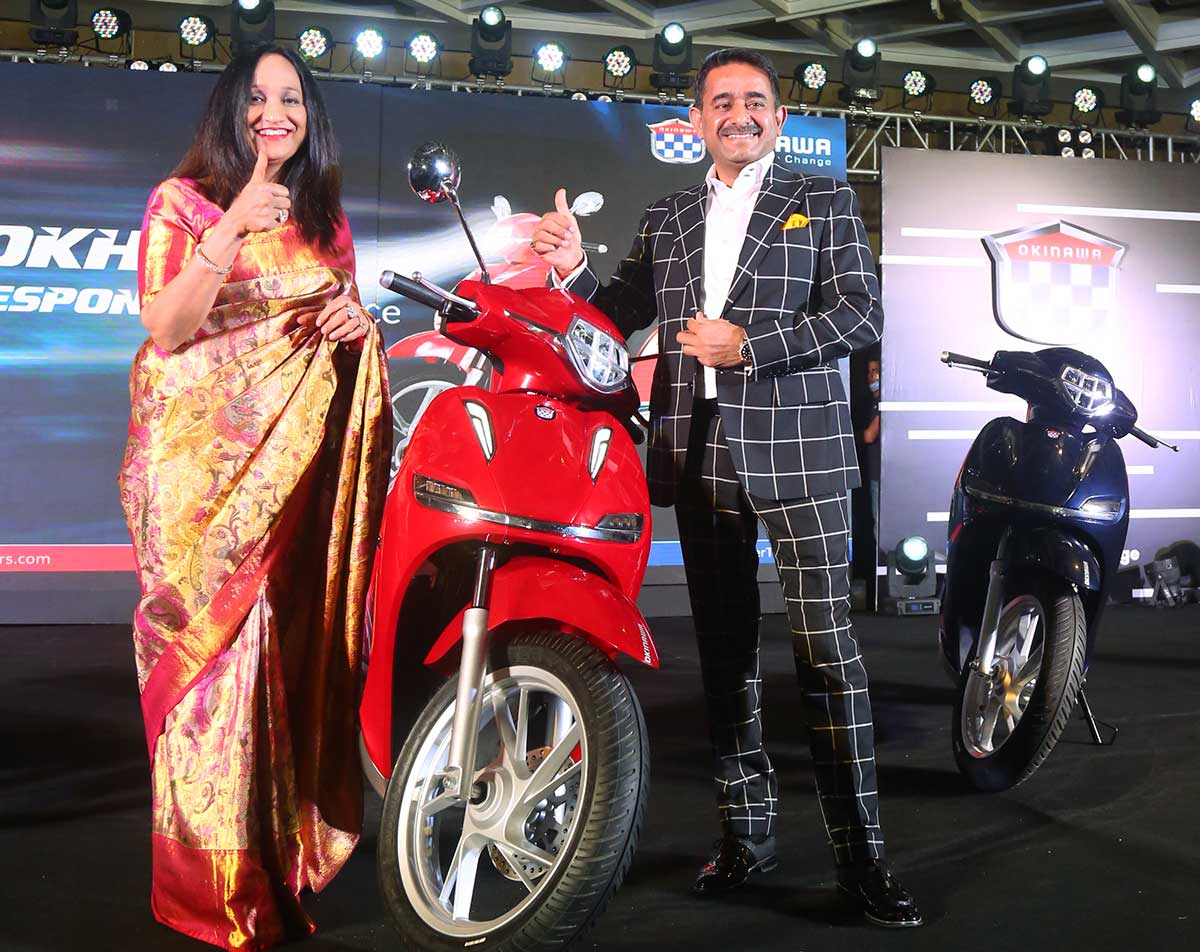EV dealers find that without FAME there’s no fortune
Subsidies have been stopped for several manufacturers that are under investigation for alleged violations of local-sourcing rules.
IMAGE: Okinawa Autotech, MD and Founder, Jeetender Sharma and Chairperson Rupali Sharma during the launch of Okinawa Okhi 90 electric scooter, at the Leela Ambience Convention Hotel, in New Delhi. Photograph: ANI Photo
Business is turning tough for dealers of several electric vehicle (EV) makers whose subsidies under the Faster Adoption and Manufacturing of (Hybrid &) Electric Vehicles (FAME) scheme have been stopped by the Centre.
With dwindling supplies from manufacturers, these dealers say, customers are moving to other brands.
Most dealers of the defaulter original equipment manufacturers (OEMs) this paper spoke to said they were rethinking their decision to stay in business because their losses had piled up and sales dwindled.
The decline in sales is largely because of price hikes and longer waiting periods as the OEMs await a decision on the resumption of subsidies.
Subsidies have been stopped for several manufacturers that are under investigation for alleged violations of local-sourcing rules.
Okinawa Scooters and Hero Electric were on the first list of the OEMs to have their subsidies arrested in September last year, as reported by Business Standard.
Of the 64 OEMs registered under FAME II so far, at least 17 have been debarred from subsidies, according to the data on the website of the Ministry of Heavy Industries.
A majority of the dealers facing the brunt of this sell products of Okinawa Scooters and Hero Electric. The two together contributed to close to 83 per cent of the EVs sold by the 17 defaulter OEMs in during 2022.
Anil Singh, an Okinawa Scooters dealer in Mumbai who received around 200 bookings in January, said he got just 50 vehicles in the month.
“I have no idea how to convince my customers to wait. Our waiting period has crossed one month. Since October, we are getting assurances of supplies but not orders,” Singh said.
Despite price hikes denting Okinawa Scooters’ market, Singh said, people are willing to buy the vehicles but are wary of the waiting period.
“We are losing customers because other brands are giving products on the same day or have a waiting period of barely 7-15 days,” Singh added.
Emails sent to Okinawa Scooters to respond to the concerns remained unanswered till press time.
In January sales of electric vehicles declined over 15 per cent as against the all-time monthly high of 119,483 units recorded in November, according to the data on the VAHAN portal of the Ministry of Road Transport and Highways.
Sales of largest barred OEMs — Okinawa Scooters and Hero Electric — declined 51 per cent and 29 per cent, respectively.
When asked about the decline in sales, Sohinder Gill, chief executive officer, Hero Electric, told this paper: “An acute shortage of working capital is being faced by the start-ups and micro, small and medium enterprises like us and that is leading to a further loss in volumes.”
Arun Kumar, another Okinawa Scooters dealer in Delhi-NCR, who received supplies in the first week of January after a delay of over one month, said buyers had moved to another brands.
“I sold 10 vehicles in January as against 60 in October. Buyers are switching to cheaper brands because Okinawa Scooters has increased the prices of its popular products by 30-40 per cent,” Kumar said.
Kumar said he was generating revenues of around Rs 50,000 a month as against an expenditure of Rs 2.5 lakh.
“I am planning to close down operations if Okinawa Scooters does not come up with a solution soon.”
Ram Sharma, a Hero Electric dealer in north Rajasthan, said the company was asking them to sell single-battery scooters because it had a subsidy of Rs 24,000 as against Rs 45,000 for a double-battery scooter.
The company wants to avoid the loss of an additional Rs 21,000 on each product, Sharma said.
“It is easy to convince a single-battery scooter buyer to purchase a double-battery scooter by explaining the performance quality. Doing the opposite is almost impossible because there are better options from other brands.”
More than 80 per cent of demand is for double-battery scooters because the price difference is just Rs 17,000.
Meanwhile, in February sales of both the E2W manufacturers were lower than in January.
Until February 25, Okinawa Scooters and Hero Electric had sold 3,294 and 5,014 units, respectively.
Okinawa touched its monthly high in October last year, when it sold 14,944 vehicles, and Hero Electric recorded its highest sales in March 2022 with 13,562 units.
The names of the dealers have been changed on request.
Feature Presentation: Ashish Narsale/Rediff.com
For all the latest business News Click Here

